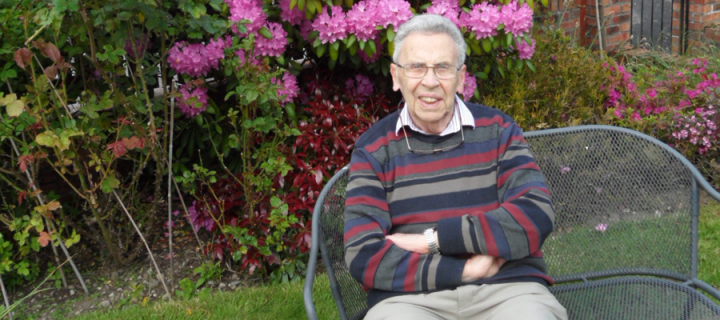Gerald Wiener
From a Kindertransport to a fellow of the Royal Society of Edinburgh, Gerald Wiener's life and career in animal genetics is worthy of a book; luckily one has been written.
| Name | Gerald Wiener |
| Degree Course | BSc Agric, PhD (Anim. Genetics), DSc |
| Year of Graduation | 1947, 1951, 1976 |

Your time at the University
I chose Edinburgh because of the high reputation of its agriculture degree (the oldest chair of agriculture in the UK – now sadly no more). I took an active role in student affairs as Secretary of the students’ Agricultural Society and President of the Scottish Association of Agricultural Students. I won the Steven Scholarship in Agriculture - the premier award in 1947.
Summer jobs included potato inspection for the Scottish Department of Agriculture, and I enjoyed Saturday night dances at the Students’ Union.
This research stretched over more than ten years and the discovery was recognised as a world first and received much scientific interest and attention.
Tell us about your Experiences since leaving the University
I joined the ARC Animal Breeding Research Organisation (ABRO) as the first junior scientist in the year, 1947, when the organisation established its headquarters in Edinburgh. The move to Edinburgh was aided by the reputation that Edinburgh University already had in animal genetics at the then Institute of Animal Genetics. Waddington, who was appointed chief geneticist of the organisation, was also appointed to the chair at the Institute – that helped to create the bond with Edinburgh.
I undertook research into causes of variation (genetic, maternal, and environmental) in performance of cattle but in much greater detail with long-term experiments in sheep. Discovered, inter alia, that the absorption of copper (an essential trace element) from the gut was in part genetically controlled. This research stretched over more than ten years and the discovery was recognised as a world first and received much scientific interest and attention. I became head of the Department of Physiological Genetics in ABRO and deputy director of the organisation prior to my formal retirement in 1986 (compulsory at age 60).
Thereafter I undertook a variety of consultancies for the Food and Agriculture Organisation of the United Nations and the British Council. The most notable of these were to Ethiopia, India and China. The Chinese work was concerned with the yak and, as senior author of a textbook on the yak, I became regarded as something of an authority.
I am an honorary Professor of two Chinese Universities, a fellow of the Royal Society of Edinburgh and of the Society of Biology, and an honorary member of the British Society of Animal Science whose scientific Journal I edited for 25 years.
I have also published two textbooks, chapters in others, and over a hundred papers in scientific journals.
Outside of my scientific career I have taken an active role in the affairs of my church both in Edinburgh and Biggar (Church of Scotland). I took a leading role in the establishment of the Eric Liddell Centre in Edinburgh – an outreach from the church – and was its chairman for six years. In Biggar I helped to establish the charity “Biggar and District Community Heritage Ltd.” to provide a focus for community projects and was its chairman for several years before moving to Inverness in 2008.
I came to the UK on a “Kindertransport” as a refugee from Nazi Germany prior to WW2. This made my career combined with my family background somewhat unusual in the eyes of author Margaret M Dunlop and prompted her to write my biography – currently awaiting a publisher.
Alumni wisdom
At the age of 89 I think the mores for students have changed so much as to make any “wisdom” on my part suspect in the eyes of the current generation of students. However, it is my belief that student days at a university like Edinburgh are a very privileged time of life, to be recognised as such and to be enjoyed – but not to the point of forgetting to study hard, as getting a good degree will be a lasting asset.

